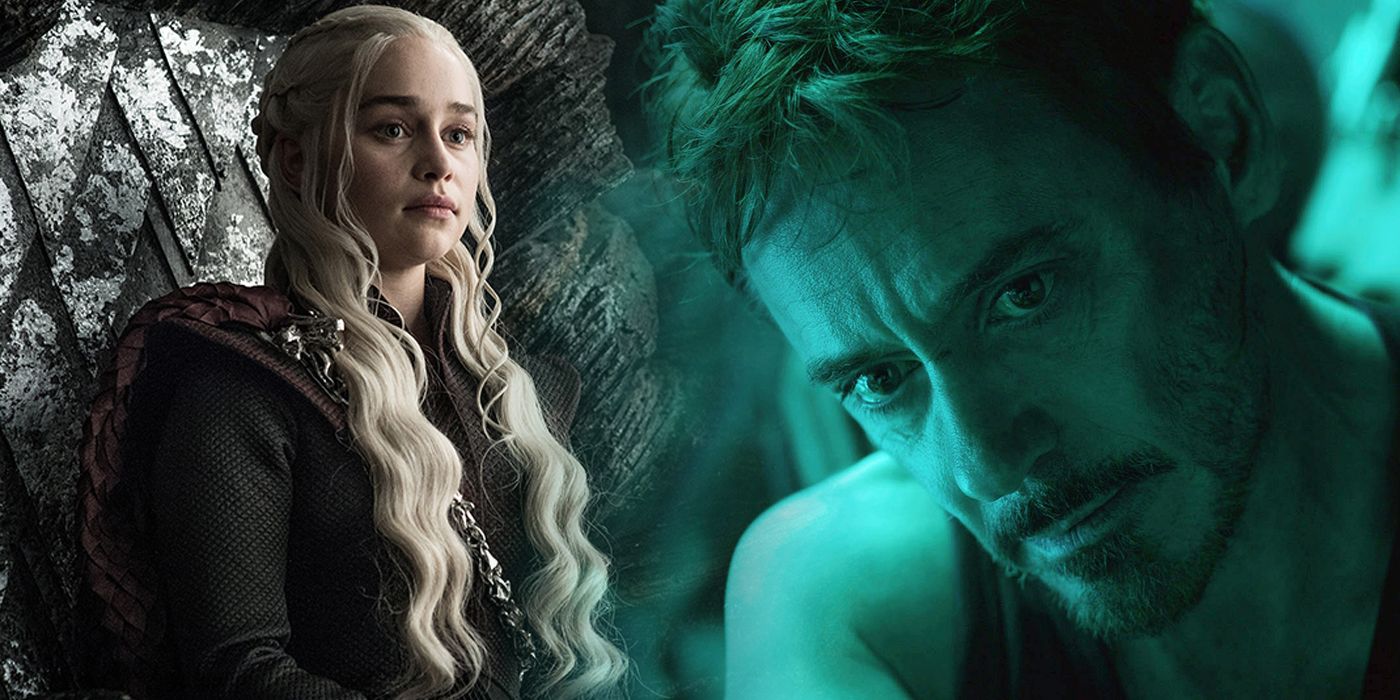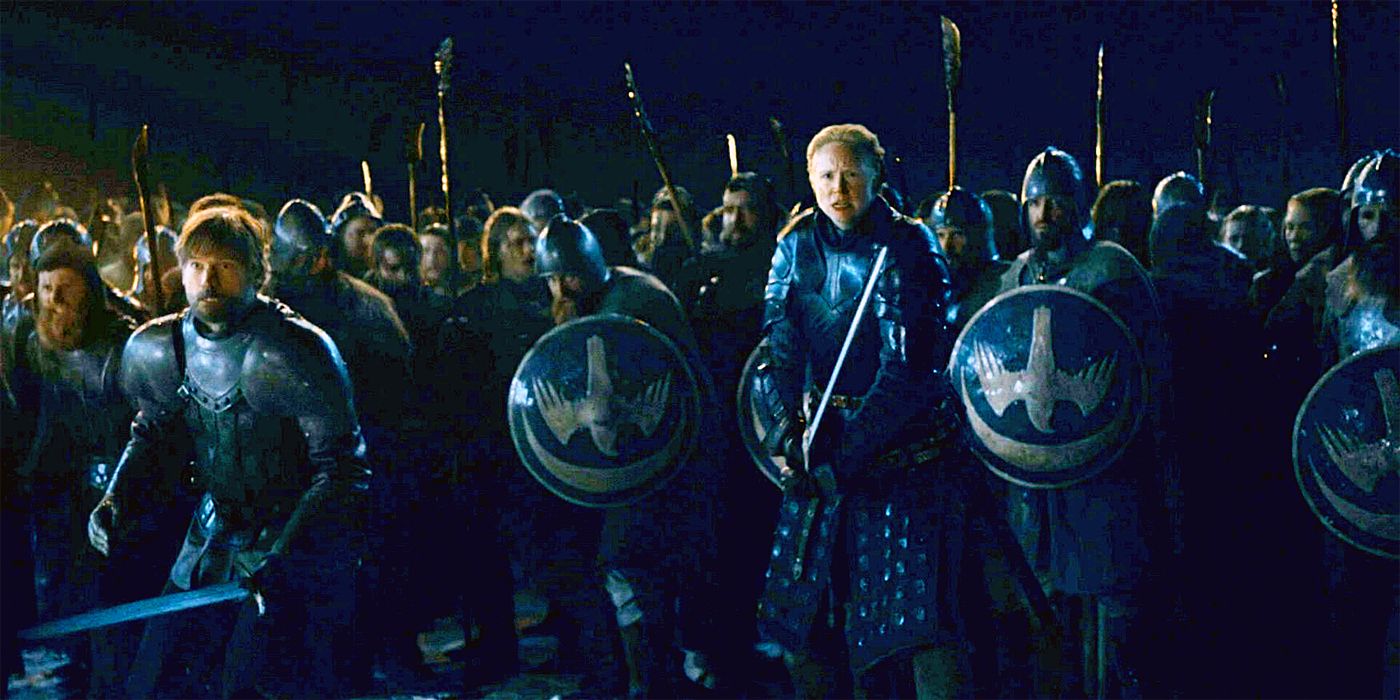This weekend brought the high-profile premiere of Avengers: Endgame and the continuation of the final season of Game of Thrones. Fans of the former treated even the most minor plot details as sacrosanct, resulting in anger at anything perceived to be a spoiler. However, the same rules didn't seem to apply to Game of Thrones, as the biggest moments of Episode 3 were tweeted and turned into memes in time with the show's East Coast airing.
Spoilers have always been an issue in fandom, but there's a real difference in how those consuming the two different pieces of media talk about them online. Game of Thrones fans seem much more willing to discuss the episode within moments of its conclusion, while a lot Endgame fans are still encoding spoilers on Twitter using the ROT13 cipher, and other methods. The two groups are, in many cases, made up of the same people. Let's look at why they might be approaching the two experiences differently.
Format: TV vs. Film
People don't consume television and film in the same way because they're unique mediums. Getting major parts of Game of Thrones spoiled undoubtedly sucks, but fans have already been watching the show for seven seasons. A few major reveals probably won't keep someone from continuing with the hit fantasy drama. That's a substantial time investment -- 70 episodes and counting -- to not see the series through because of someone blurting out on social media, say, that a beloved character died during the Battle of Winterfell. Viewers will still need to catch up on the spoiled episode to be able to follow the one that airs the next week.
However, once major parts of a film are spoiled, it's a lot easier to put off seeing the movie, or waiting until it's available on home media. The Marvel Cinematic Universe's interconnected nature somewhat duplicates the nature of serialized television in this way, but the franchise's next installment, Spider-Man: Far From Home, hits theaters in July; the next episode of Game of Thrones debuts on Sunday, and if you miss that one, you'll still need to get up to speed for the Sunday after that.
Series like Game of Thrones also air at a set time. Granted, there's still a delay for some on the West Coast, but that's a matter of three hours. It's a lot easier to avoid spoilers in that interval -- especially major events that may occur at the end of an episode -- than it is to remain pristine for a major theatrical release. Someone can see Endgame, well, pretty much whenever. There are several showings a day, and there's no major coordination across markets as to when people will learn information contained in the film.
There's also the matter of venue. Courteous audience members will place their phone on silent when a film begins, and they certainly won't tweet during the screening. The viewing experience also provides a sense of community. By contrast, enjoying television at home allows the viewer to tweet; heck, they can live-tweet the entire episode, broadcasting their immediate reaction to each twist and turn. However, don't look at that as a bad thing. Tweeting while watching a show is a valid way of engaging with a community of fans enjoying the same experience, at the same time.
Marketing: Don't Spoil the Endgame
Part of what's going on also might be due to the different marketing of the two experiences, which isn't entirely indivisible from their formats. Marvel Studios has gone to great lengths to encourage fans not to "spoil the Endgame." When the filmmakers appeal to fandom, it absolutely has an effect on how people understand spoilers. In casting the movie as a monumental event filled with spoilers -- secrets! -- Endgame benefits. That approach to marketing encourages fans to avoid spoiling the movie for themselves and others while making sure the threat of learning what will happen is known, which helps to drive fans to theaters faster.
Game of Thrones' marketing, in comparison, hasn't paid much attention to spoilers, although HBO is definitely diligent about leaks. Instead, the marketing, and the fanbase, has shifted back into a culture mode that seemingly died with the birth of DVRs and PVRs: appointment viewing. Game of Thrones is must-see TV, and that's key to how spoilers work in regard to the show.
Online spoilers may actually benefit HBO, as they encourages people to watch the show as early as they can. Remember, fans will still have to see the spoiled episode to see the next episode. This means subscribing to HBO in one of the many available ways can help a fan avoid getting the show spoiled for them; they can finally use social media without fear of learning too much. Now, there is an alternate means of dealing with that issue, which is probably why Game of Thrones was most-pirated show for six consecutive years, but that's another challenge for TV entirely.
Airing Sundays at 9 p.m. ET on HBO, Game of Thrones stars Peter Dinklage as Tyrion Lannister, Nikolaj Coster-Waldau as Jaime Lannister, Lena Headey as Cersei Lannister, Emilia Clarke as Daenerys Targaryen, Sophie Turner as Sansa Stark, Maisie Williams as Arya Stark and Kit Harington as Jon Snow.
Directed by Joe and Anthony Russo, Avengers: Endgame stars Robert Downey Jr. as Iron Man, Chris Evans as Captain America, Mark Ruffalo as Bruce Banner, Chris Hemsworth as Thor, Scarlett Johansson as Black Widow, Jeremy Renner as Hawkeye, Brie Larson as Captain Marvel, Paul Rudd as Ant-Man, Don Cheadle as War Machine, Karen Gillan as Nebula, Danai Gurira as Okoye and Bradley Cooper as Rocket, with Gwyneth Paltrow Pepper Potts, Jon Favreau as Happy Hogan, Benedict Wong as Wong, Tessa Thompson as Valkyrie and Josh Brolin as Thanos.



